This article was medically reviewed by Luba Lee, FNP-BC, MS. Luba Lee, FNP-BC is a Board-Certified Family Nurse Practitioner (FNP) and educator in Tennessee with over a decade of clinical experience. Luba has certifications in Pediatric Advanced Life Support (PALS), Emergency Medicine, Advanced Cardiac Life Support (ACLS), Team Building, and Critical Care Nursing. She received her Master of Science in Nursing (MSN) from the University of Tennessee in 2006.
There are 31 references cited in this article, which can be found at the bottom of the page.
wikiHow marks an article as reader-approved once it receives enough positive feedback. This article has 20 testimonials from our readers, earning it our reader-approved status.
This article has been viewed 5,005,117 times.
Stomach cramps are extremely painful, but it's possible to relieve them by treating the underlying cause, which you may even be able to do at home. Possible causes of stomach cramps can come from your digestive organs, aorta, appendix, kidneys, gallbladder, or spleen. They can also originate from an infection elsewhere in your body.[1] Cramps are commonplace for some women during their menstrual cycle, although exercises can often alleviate such pain. The strength of pain does not always necessarily indicate seriousness: very painful cramps can be caused by gas passing through your digestive system harmlessly, whereas life-threatening conditions such as colon cancer and early appendicitis can produce mild or even no pain.[2]
Steps
Treating Heartburn/Indigestion
-
1Look for signs of heartburn and/or indigestion. Although heartburn and indigestion are different, indigestion can lead to heartburn. Indigestion, or dyspepsia, ismild discomfort in the upper part of your abdomenthat is usually accompanied by a feeling of fullness.[3] Heartburn, on the other hand, is apainful, burning feeling just below or behind the breastbone.[4] This is caused by a “reflux” of stomach acid and food into the esophagus (the muscular tube that leads to your stomach).
- Additional signs that you have heartburn or indigestion include fullness and discomfort after eating and/or a burning sensation below the breastbone generally after eating.
- See if you have any sensitivity after eating certain foods, such as gluten, eggs, or peanuts. Try eliminating the foods from your diet for 4 weeks to see if your symptoms improve.
-
2Check for signs of small intestine bacterial overgrowth. Small intestine bacterial overgrowth, or SIBO, can cause cramps, bloating, gassiness, and abdominal discomfort. Talk to your primary healthcare provider if you have any of the symptoms to see if there’s a prescription antibiotic or antifungal you can get.[5]Advertisement
-
3Make lifestyle changes. Lifestyle changes can help prevent and resolve heartburn and indigestion.[6] [7]
Lifestyle Changes
Decreasing your alcohol and caffeine intake
Eating less spicy, fatty, or greasy foods
Eating small, frequent meals instead of large meals
Eating slower and not eating right before bedtime
Raising the head of your bed if you experience heartburn during the night
Reducing your stress level
Regular exercise
Smoking cessation
Losing some weight if you are overweight
Avoiding aspirin or NSAIDs -
4Take antacids for short-term relief. Over-the-counter antacids or acid blockers can help relieve heartburn and indigestion. Many different forms are available on the market. Some antacids can have side effects such as constipation or diarrhea. Talk to your pharmacist or doctor to choose the best one for you.[8] [9]
- Avoid taking antacids over a long-term period of time since it could make SIBO, malabsorption, or IBS feel worse.
Available Acid Blockers
Antacids, such as TUMS, are good for short-term relief. These neutralize the acid in your stomach.
H2 blockers, such as Zantac or Pepcid, block the production of stomach acid and last a few hours.
Proton pump inhibitors (PPIs), including Prilosec and Omeprazole, also block production of stomach acid and help relieve the symptoms of and prevent frequent heartburn. PPIs are used long term. -
5Try herbal/natural remedies. If you prefer herbal remedies, alternative medication may help relieve heartburn or indigestion.[10]
Natural Remedies
Chamomile: There is some evidence that shows chamomile in combination with other herbs may be good for an upset stomach. Try a cup of chamomile tea to help soothe the pain.[11] Do not use chamomile if you take anticoagulants, as it interferes with these medications.
Peppermint Oil: Enteric-coated peppermint oil capsules can be used for irritable bowel syndrome. There are some studies that peppermint oil with caraway oil can also help with indigestion.[12]
Deglycyrrhizinated licorice (DGL): Licorice root, in preliminary studies, has been shown to help with digestion and heartburn. It can, however, cause an increase in blood pressure.
Treating Gas
-
1Identify if you have gas. Often, gas can cause stomach pain and a bloated feeling. Signs that you are experiencing gas include frequent belching or burping and flatulence. Gas can also cause abdominal cramps, as well as a tightness or knotted feeling in your abdomen.[13]
-
2Make lifestyle changes. Lifestyle changes can help resolve and prevent gas. Some lifestyle changes that you can make include:[14] [15]
- Drinking more water and less carbonated or fizzy drinks
- Avoiding vegetables that cause more gas, such as legumes, broccoli, and cabbage
- Avoiding high-fat or high-sugar foods
- Eating slower to avoid swallowing air
-
3Look for food intolerances. Cut out certain foods to see if intolerance of those foods is the cause. For example, milk and dairy products may cause cramps and stomach pain in people who are lactose intolerant.[16]
-
4Take an over-the-counter remedy. OTCproducts with simethicone help make it easier to belch away gas.Digestive enzymes may be useful if you are lactose intolerant. A digestive aid, such as Beano, can help digest beans and vegetables. Charcoal tablets can also help relieve bloating and gas.[17]
Treating Constipation
-
1Consider if constipation is another symptom. Constipation can also cause stomach pain. Signs of constipation includehaving bowel movements less than three times a week, trouble passing stool, or hard and dry stool.[18]
-
2Make lifestyle changes. Lifestyle changes can help resolve and prevent constipation. Some lifestyle changes that you can make include:[19] [20]
- Adding more fiber to your diet. Fruits, vegetables, and grains are high in fiber.
- Drinking a lot of water (at least 8 – 13 glasses daily)
- Exercising regularly
-
3Take an effective medication. There are many OTC laxatives and fiber supplements; however, many laxatives may have side effects. Choosing the appropriate one may help relieve constipation. It is important to note that laxatives are not for long-term use.[21]
Laxatives to Try
Lubricants, such as mineral oil, make it easier for stool to pass.
Stool softeners, such as docusate, soften the stool. This is good for patients who are on medications that cause constipation.
Bulk-forming laxatives, including psyllium, add bulk to the stool.
Stimulant laxatives, such as bisacodyl, cause contraction of the muscles of the intestinal wall helping to push the stool; however, long-term use can cause damage to your intestinal wall.
Osmotic laxatives, like saline laxatives or polyethylene glycol, cause water to be drawn into your GI tract, making it easier for stool to pass. These may cause electrolyte imbalances.
Fiber supplements, like Metamucil, help absorb water and maintain regularity. -
4Try an herbal remedy. Alternative medications may help relieve constipation.Flaxseed is the most common herbal remedy.It has soluble fiber that can help with constipation.[22]
Treating Menstrual Cramps
-
1Look for a correlation between cramping and your period. Menstrual cramps in the lower abdomen are experienced by women usually just before and/or during their periods.[23] Sometimes they can be serious and indicate endometriosis or uterine fibroids.
-
2Make lifestyle changes to relieve your symptoms. Lifestyle changes that can help relieve menstrual cramps include exercise, stress management, and avoiding tobacco and alcohol. In addition, studies have shown that vitamin E, omega-3 fatty acids, vitamin B-1 (thiamine), vitamin B-6, and magnesium supplements may reduce menstrual cramps.[24]
-
3Try over-the-counter treatments.Pain relievers, such as ibuprofen, at regular doses starting the day before you get your periodmay help if your cramps are predictable. Try a 200-400 mg dose of ibuprofen up to 3 times per day. You can continue taking the medicine as directed by your doctor for 2 to 3 days or until your symptoms go away. If your cramps are severe, your doctor can also prescribe birth control, which can reduce the severity of your cramps.[25]
- Try applying a warm heating pad on your lower abdomen for 15-20 minute increments.
-
4Try herbal alternatives. Some studies have found that acupuncture (inserting thin needles through your skin at strategic points) helps relieve menstrual cramps. In addition, some herbs such as fennel or chamomile may help with the cramps as well.[26]
Treating Stomach Flu
-
1Look for other flu-like symptoms. Gastroenteritis, or the “stomach bug,” can cause severe stomach pain.Nausea, vomiting, diarrhea, and a fever generally accompany this.[27]
-
2Stay hydrated. Dehydration is the most common issue with gastroenteritis, so drink a lot of liquids such as water and diluted sports drinks (undiluted, sports drinks contain too much sugar. Try cutting them by adding more water.). Take them in frequent sips. Get medical help if you cannot keep down liquids.[28]
Signs of Dehydration
Dark urine
Dizziness
Muscle cramps
Fatigue
Dry mouth[29] -
3Let your stomach settle. In addition to stomach cramps, vomiting and nausea are associated with gastroenteritis.[30] Let your stomach settle then slowly begin to eat easy-to-digest and bland foods. Avoid spicy and fatty food, dairy products, caffeine, and alcohol for a few days.
Easy-to-Digest Foods
Saltine crackers
Toast
Bananas
White rice
Applesauce
Eggs
Sweet potatoes
Gelatin -
4Get plenty of rest. Getting rest is important to be able to recover quickly. Rest helps promote your immune system, which will help you reduce downtime while you have symptoms.[31]
-
5Wash your hands often. Viral gastroenteritis, commonly known as the stomach flu or stomach bug, is highly contagious and can cause diarrhea and stomach pain. If a friend, family member, or coworker has the stomach flu, make sure to wash your hands often to prevent the spread of it.[32]
Using Other Techniques to Relieve Discomfort
-
1Use breathing techniques. Breathing is relaxing and can divert your attention from the pain of mild cramps.[33] You can do this while doing something else that will divert your attention, such as watching a television show.
- Focus on your breathing. Use a fast and shallow breathing rate, following a one-two (breathe in fast, breathe out fast) rhythm.
- Focus on your breathing.
-
2Avoid certain beverages. Alcohol or any caffeinated or carbonated drink can add to abdominal pain. Sip water or clear fluids.[34]
-
3Try to exercise the cramps away. Take a walk around your house, or in the garden. This can be helpful when you find that sitting or lying down is uncomfortable. Moving around can help relieve intestinal and stomach discomfort.[35]
- You may find it best to avoid abdominal exerciseswhile experiencing cramps due to the discomfort, especially because cramps may result from exercise itself if you push yourself too hard. Know your limits.
- You may find it best to
-
4Try yoga. Some evidence suggests yoga may help with stomach issues such as irritable bowel syndrome.[36] If you're familiar with yoga, consider someposes that open up the abdominal region.Depending on where the cramps are, consider fish pose or reclining hero. Downward facing dog can also be helpful.
- If your cramps are muscular in nature, exercise your abdominal muscles at another time and merely stretch them in the cobra pose. Any position where you are facing up, looking forward or facing the ceiling will result in a minuscule amount of abdominal tension.
-
5Use a heating pad. Place a heating pad, heated wheat bag, or hot water bottle on your stomach to give temporary relief, especially for menstrual cramps.[37] While some advice suggests not to apply the heating pad to your abdomen in case this brings on nausea, other advice considers this to be appropriate. Decide on which approach best suits your needs through your knowledge of your own preferences and responses to the application of heat.
-
6Pass gas. Allow yourself to pass gas. If you are at work or somewhere this might be embarrassing or inappropriate, just excuse yourself and go to the restroom. You do not want to allow yourself to become bloated or let the cramps become more serious and painful by holding in your gas.[38]
-
7Take a soak in a warm bath. The heat from a warm bath can help soothe and relax your stomach cramps and is really effective at relieving the pain caused by menstrual cramps.[39] Don't make it too hot, just comfortable.
Contacting Your Doctor
-
1Know when to get immediate assistance. Knowing when to contact a doctor or get help is essential. Stomach pain is a symptom of many different issues and some can be serious, such as peptic ulcers, pancreatitis, appendicitis, autoimmune disease, gall bladder issues, cancer, and more. Generally for stomach pain, get help immediately if:[40]
- You have abdominal pain that is sudden and sharp, or you have pain in your chest, neck, or shoulder
- You’re vomiting blood or have blood in your stool
- Your abdomen is hard and tender to touch
- You can't move your bowels and are also vomiting
- You can’t hold down liquids
-
2Determine if your heartburn/indigestion requires medical assistance. Though these conditions are typically minor and can easily be treated with over-the-counter medicines, you should see your doctor if:[41] [42]
- Your symptoms last longer than a few days or do not improve with medication
- You lose weight you were not trying to lose
- You have sudden or severe pain. Get immediate care if you feel a crushing or squeezing pain.
- You have trouble swallowing
- Your skin or eyes look pale or yellow
- You vomit blood or have bloody, dark stool
- Your stool looks like coffee grounds
-
3Determine if your gastroenteritis requires medical assistance. The other symptoms also associated with “stomach flu” can lead to a situation where you should see a doctor. These include:[43] [44]
- You have been vomiting for more than two days
- Diarrhea persists more than several days or is bloody
- You have a persistent high fever of 101°F (38.3°C) or higher
- You have lightheadedness, fainting, or confusion when standing
-
4Avoid certain medications before seeing your doctor. If or when you do decide to see a doctor,do not take aspirin, ibuprofen, or any other anti-inflammatory medications or narcotic pain medications unless your doctor has seen you and has prescribed these.They can worsen some stomach pains.[45]
Foods to Eat and Avoid and Tips for Dealing with IBS
Expert Q&A
Did you know you can get expert answers for this article?
Unlock expert answers by supporting wikiHow
-
QuestionWhat foods cause stomach cramps?
 Michele DolanMichele Dolan is a BCRPA certified Personal Trainer in British Columbia. She has been a personal trainer and fitness instructor since 2002.
Michele DolanMichele Dolan is a BCRPA certified Personal Trainer in British Columbia. She has been a personal trainer and fitness instructor since 2002.
Certified Fitness Trainer Every person is different but foods that are more common for causing cramps include dairy, legumes such as chick peas, beans and lentils, cruciferous vegetables such as cauliflower, broccoli and cabbage, popcorn, plus spicy or greasy deep fried foods. Pay attention to when you get cramps and try to recollect what foods you've consumed recently to nail down the offending substance.
Every person is different but foods that are more common for causing cramps include dairy, legumes such as chick peas, beans and lentils, cruciferous vegetables such as cauliflower, broccoli and cabbage, popcorn, plus spicy or greasy deep fried foods. Pay attention to when you get cramps and try to recollect what foods you've consumed recently to nail down the offending substance. -
QuestionI have gotten severe cramps in my stomach due to exercising a lot. What can I do?
 Michele DolanMichele Dolan is a BCRPA certified Personal Trainer in British Columbia. She has been a personal trainer and fitness instructor since 2002.
Michele DolanMichele Dolan is a BCRPA certified Personal Trainer in British Columbia. She has been a personal trainer and fitness instructor since 2002.
Certified Fitness Trainer Cramps from overdoing exercise can be caused by several things; including dehydration, overuse of muscles, poor posture, gravity pulling abdominal muscles downward, and deficiencies in minerals such as magnesium, calcium and potassium. Slow down or stop the exercise, take some sips of diluted sports drink, raise your arms above your head and take long slow deep breaths. In the future, stay hydrated, bring fluids along with you when exercising, and keep the exercise less intense so you can work up your fitness level more gradually and your body can adjust to the exercise. If the cramps persevere for longer than a few weeks, or become severe, seek medical attention.
Cramps from overdoing exercise can be caused by several things; including dehydration, overuse of muscles, poor posture, gravity pulling abdominal muscles downward, and deficiencies in minerals such as magnesium, calcium and potassium. Slow down or stop the exercise, take some sips of diluted sports drink, raise your arms above your head and take long slow deep breaths. In the future, stay hydrated, bring fluids along with you when exercising, and keep the exercise less intense so you can work up your fitness level more gradually and your body can adjust to the exercise. If the cramps persevere for longer than a few weeks, or become severe, seek medical attention. -
QuestionWould avoiding FODMAPs help cramps?
 Luba Lee, FNP-BC, MSLuba Lee, FNP-BC is a Board-Certified Family Nurse Practitioner (FNP) and educator in Tennessee with over a decade of clinical experience. Luba has certifications in Pediatric Advanced Life Support (PALS), Emergency Medicine, Advanced Cardiac Life Support (ACLS), Team Building, and Critical Care Nursing. She received her Master of Science in Nursing (MSN) from the University of Tennessee in 2006.
Luba Lee, FNP-BC, MSLuba Lee, FNP-BC is a Board-Certified Family Nurse Practitioner (FNP) and educator in Tennessee with over a decade of clinical experience. Luba has certifications in Pediatric Advanced Life Support (PALS), Emergency Medicine, Advanced Cardiac Life Support (ACLS), Team Building, and Critical Care Nursing. She received her Master of Science in Nursing (MSN) from the University of Tennessee in 2006.
Board-Certified Family Nurse Practitioner Food sensitivities, as well as small intestinal bacterial overgrowth (SIBO), are often the cause of stomach cramps. When you have SIBO and eat FODMAP- rich foods the bad bacteria in your intestine overproduce gas leading to cramps. You may want to try an elimination diet or at least start with low FODMAP diet and see if your symptoms of gas, bloating and cramps improve.
Food sensitivities, as well as small intestinal bacterial overgrowth (SIBO), are often the cause of stomach cramps. When you have SIBO and eat FODMAP- rich foods the bad bacteria in your intestine overproduce gas leading to cramps. You may want to try an elimination diet or at least start with low FODMAP diet and see if your symptoms of gas, bloating and cramps improve.
Warnings
- Poisoning, including some animal and insect bites, can cause severe abdominal pain. If you’ve been bitten, stung, or come into contact with a poisonous chemical, then call Poison Control and follow their instructions.⧼thumbs_response⧽
- This article offers information, but it does not offer medical advice. If you feel uncertain about identifying or treating your stomach cramps, then you should consult your doctor.⧼thumbs_response⧽
References
- ↑ http://www.nlm.nih.gov/medlineplus/ency/article/003120.htm
- ↑ http://www.nlm.nih.gov/medlineplus/ency/article/003120.htm
- ↑ http://www.nlm.nih.gov/medlineplus/indigestion.html
- ↑ http://www.nlm.nih.gov/medlineplus/heartburn.html
- ↑ https://pubmed.ncbi.nlm.nih.gov/26780631/
- ↑ http://www.nlm.nih.gov/medlineplus/indigestion.html
- ↑ http://www.nlm.nih.gov/medlineplus/heartburn.html
- ↑ http://www.nlm.nih.gov/medlineplus/indigestion.html
- ↑ http://www.nlm.nih.gov/medlineplus/heartburn.html
- ↑ https://pubmed.ncbi.nlm.nih.gov/18630390/
- ↑ https://nccih.nih.gov/health/chamomile/ataglance.htm
- ↑ https://nccih.nih.gov/health/peppermintoil
- ↑ http://www.nlm.nih.gov/medlineplus/gas.html
- ↑ http://www.nlm.nih.gov/medlineplus/gas.html
- ↑ http://www.nlm.nih.gov/medlineplus/ency/article/003124.htm
- ↑ http://www.nlm.nih.gov/medlineplus/ency/article/003120.htm
- ↑ https://pubmed.ncbi.nlm.nih.gov/32310457/
- ↑ http://www.nlm.nih.gov/medlineplus/constipation.html
- ↑ http://www.nlm.nih.gov/medlineplus/ency/article/003125.htm
- ↑ http://www.nlm.nih.gov/medlineplus/constipation.html
- ↑ https://pubmed.ncbi.nlm.nih.gov/28185025/
- ↑ https://nccih.nih.gov/health/flaxseed/ataglance.htm
- ↑ https://pubmed.ncbi.nlm.nih.gov/24695505/
- ↑ https://pubmed.ncbi.nlm.nih.gov/24695505/
- ↑ https://pubmed.ncbi.nlm.nih.gov/24695505/
- ↑ https://pubmed.ncbi.nlm.nih.gov/29879061/
- ↑ http://www.nlm.nih.gov/medlineplus/gastroenteritis.html
- ↑ https://pubmed.ncbi.nlm.nih.gov/29369591/
- ↑ https://pubmed.ncbi.nlm.nih.gov/27583707/
- ↑ https://pubmed.ncbi.nlm.nih.gov/31473758/
- ↑ https://pubmed.ncbi.nlm.nih.gov/30388243/
- ↑ https://pubmed.ncbi.nlm.nih.gov/31205690/
- ↑ https://pubmed.ncbi.nlm.nih.gov/21939499/
- ↑ http://www.nlm.nih.gov/medlineplus/ency/article/003120.htm
- ↑ https://pubmed.ncbi.nlm.nih.gov/30843436/
- ↑ http://www.ncbi.nlm.nih.gov/pmc/articles/PMC2642499/
- ↑ https://pubmed.ncbi.nlm.nih.gov/24695505/
- ↑ https://pubmed.ncbi.nlm.nih.gov/28508867/
- ↑ https://pubmed.ncbi.nlm.nih.gov/24695505/
- ↑ http://www.nlm.nih.gov/medlineplus/abdominalpain.html
- ↑ http://www.nlm.nih.gov/medlineplus/indigestion.html
- ↑ http://www.nlm.nih.gov/medlineplus/heartburn.html
- ↑ http://www.iffgd.org/site/manage-your-health/symptoms-causes/controlling-gas/treatment
- ↑ https://pubmed.ncbi.nlm.nih.gov/30702253/
- ↑ http://www.nlm.nih.gov/medlineplus/ency/article/003120.htm
- ↑ https://pubmed.ncbi.nlm.nih.gov/26224322/
- ↑ http://www.nlm.nih.gov/medlineplus/ency/article/003120.htm
- ↑ https://pubmed.ncbi.nlm.nih.gov/27159638/
About This Article
To cure stomach cramps caused by heartburn and indigestion, decrease your alcohol and caffeine intake, stop eating spicy foods, and eat small, frequent meals rather than a few large meals each day. If you're dealing with gas pain, try taking an over-the-counter product like Beano or charcoal tablets. You can also take 200-400 milligrams of ibuprofen up to 3 times per day to relieve pain caused by menstrual cramps. For tips on dealing with constipation-related cramps, read on!
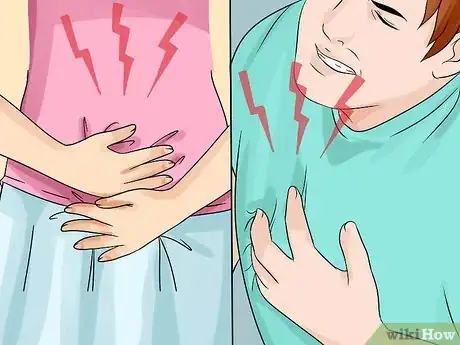
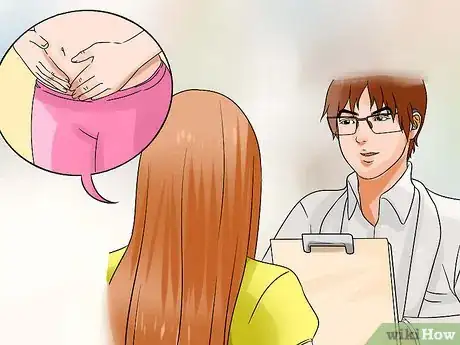
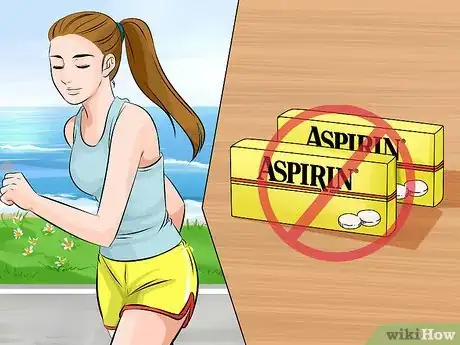
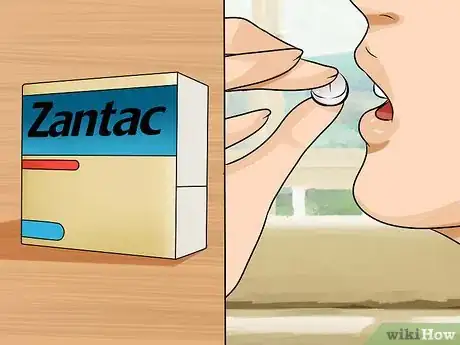

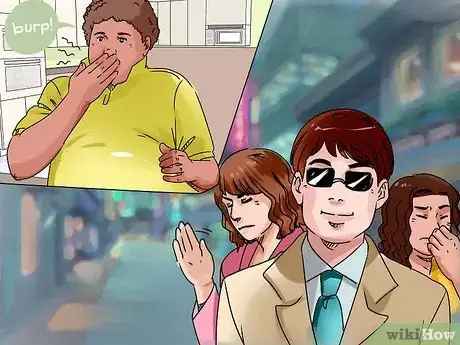
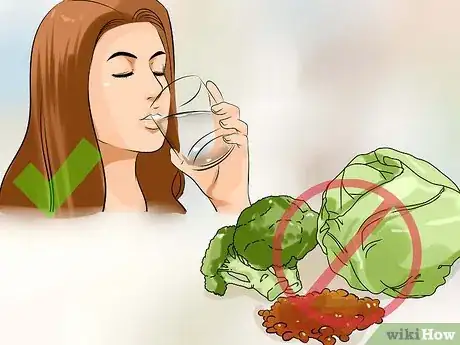
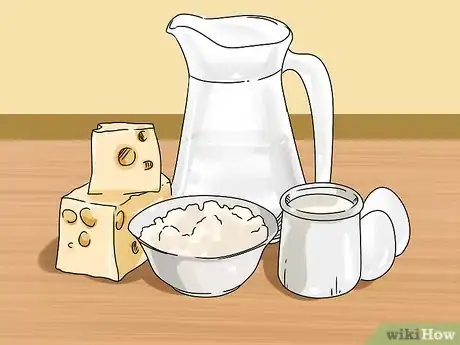

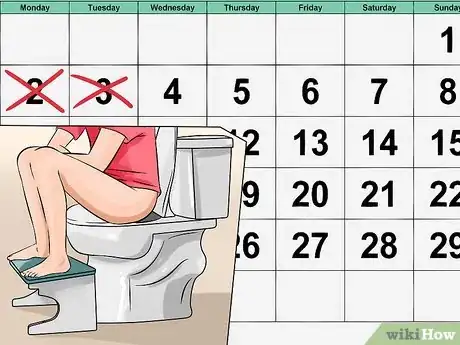
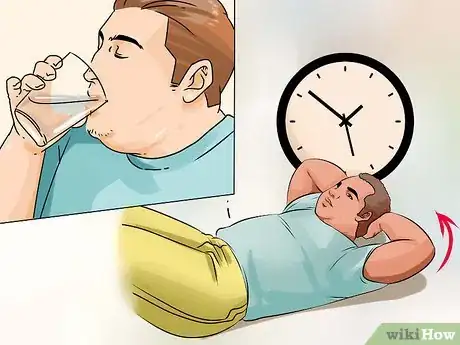
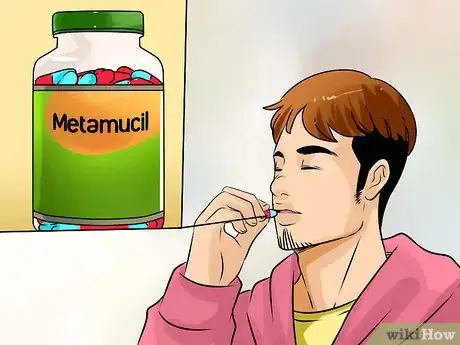
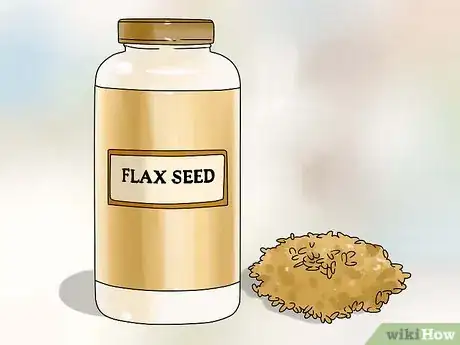
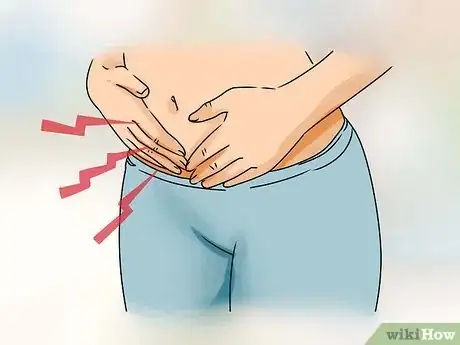
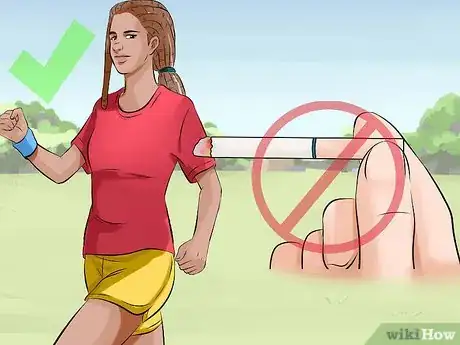
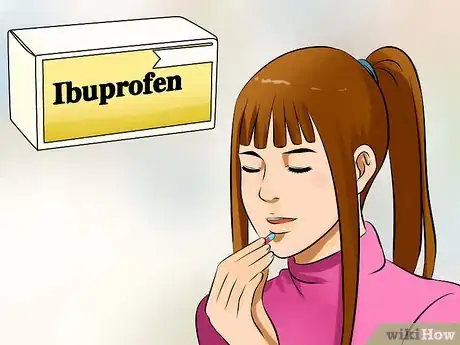

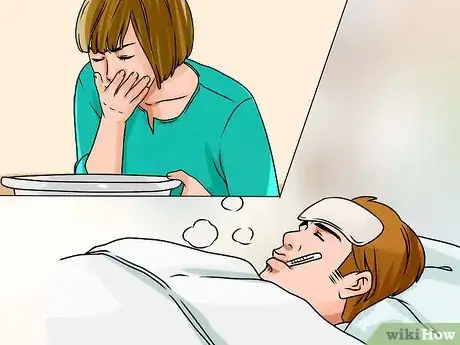
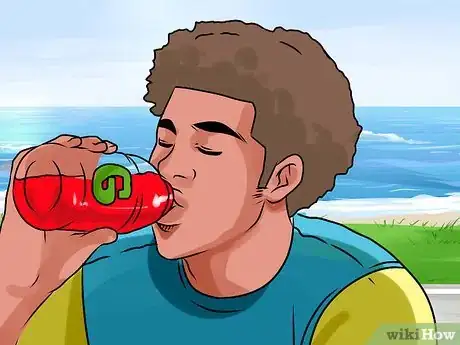
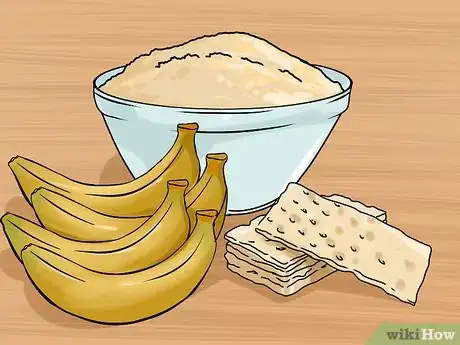
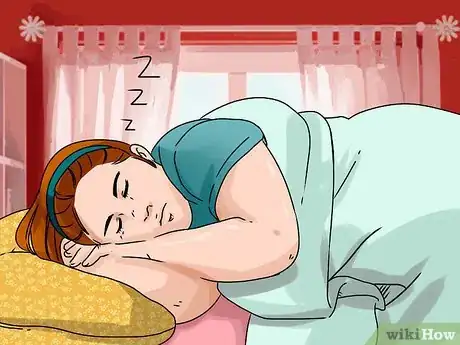
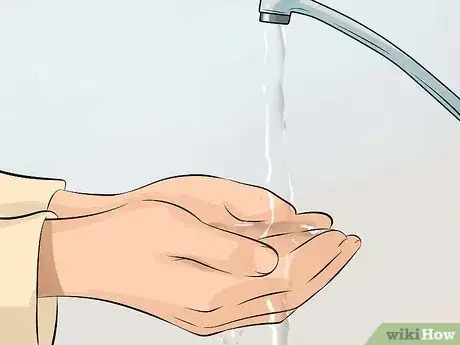
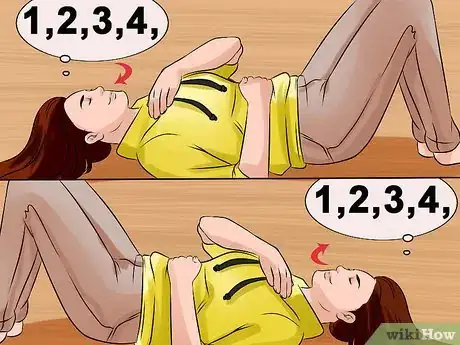
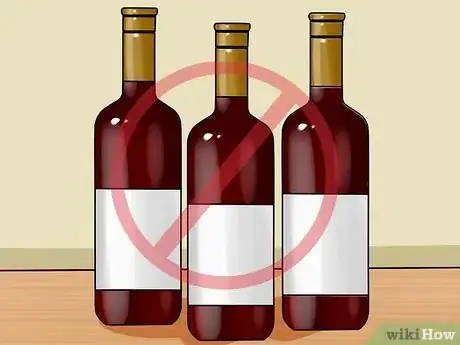
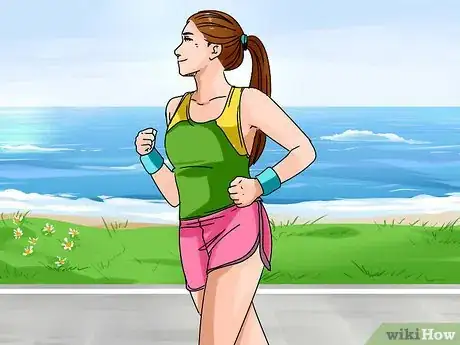
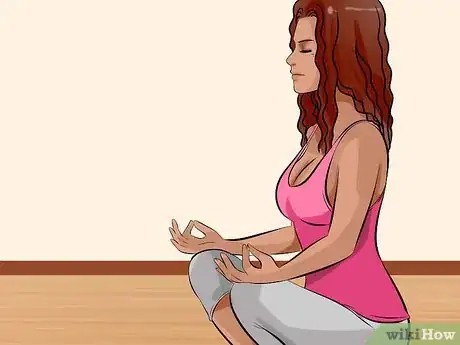
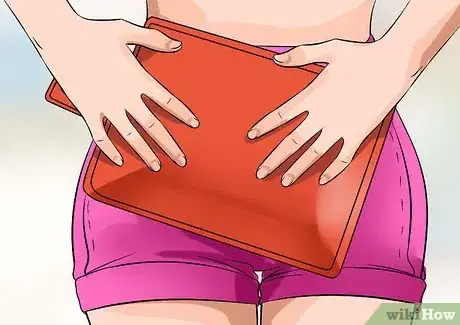

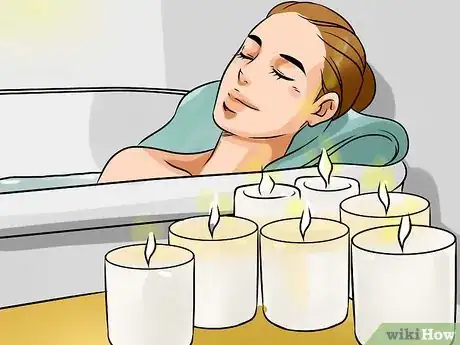
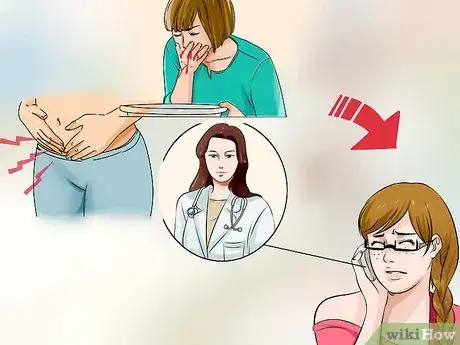
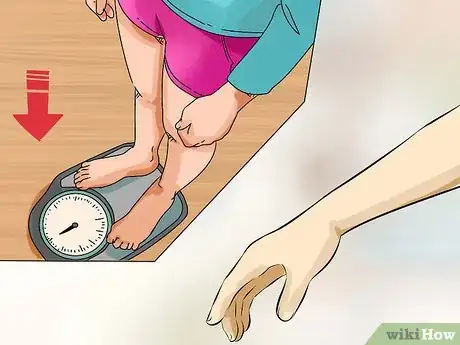
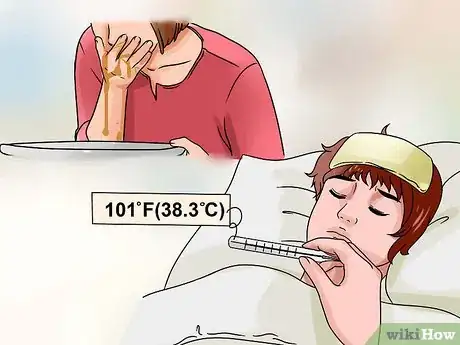
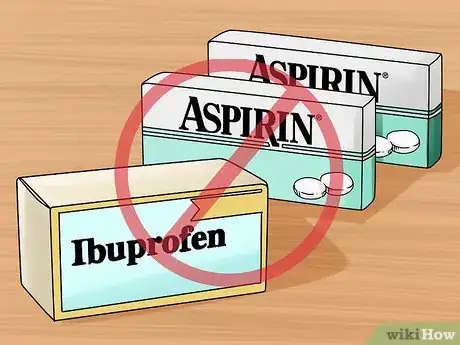





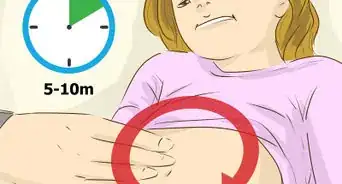


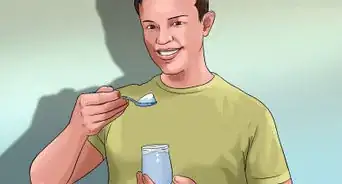
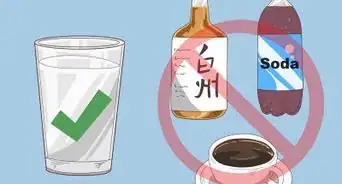

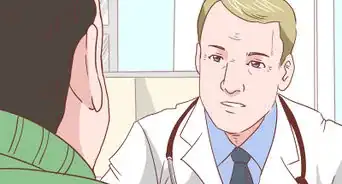
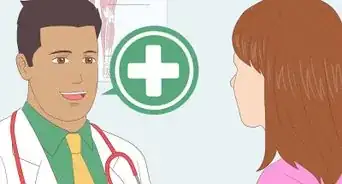
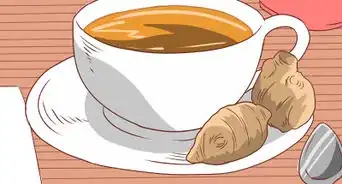
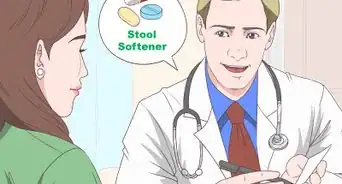
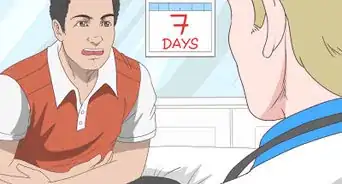
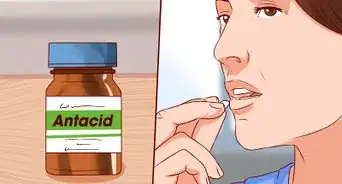











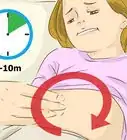




































Medical Disclaimer
The content of this article is not intended to be a substitute for professional medical advice, examination, diagnosis, or treatment. You should always contact your doctor or other qualified healthcare professional before starting, changing, or stopping any kind of health treatment.
Read More...